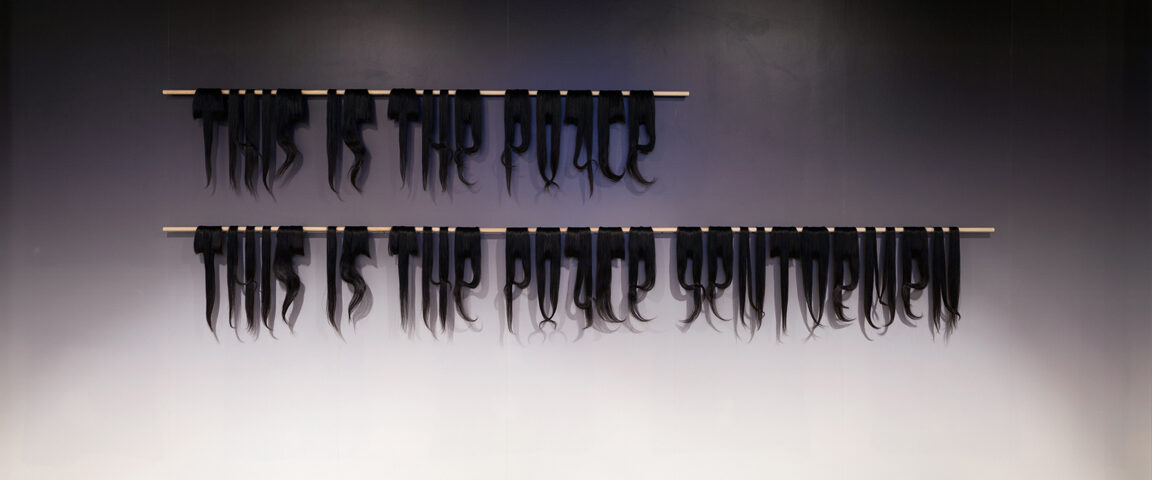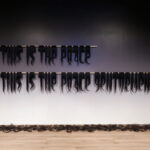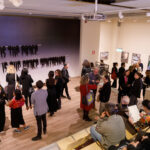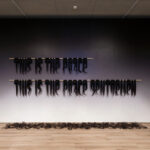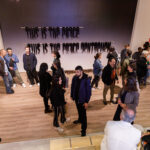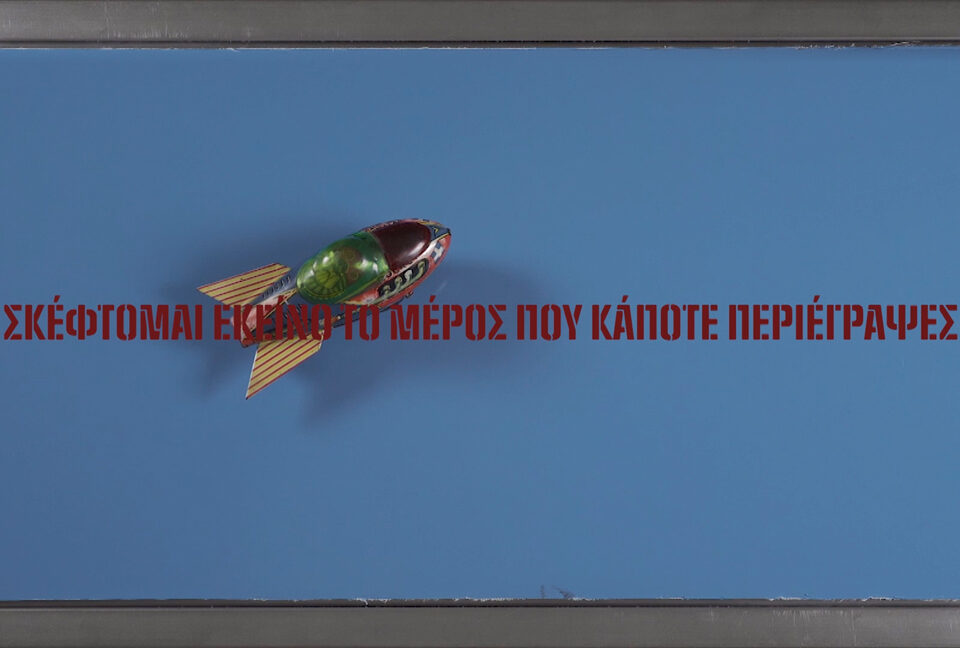This Is the Place Gentlemen! 2023
Human hair, wooden pole, 4,60 x 2,30 m.
The artwork has been commissioned by ifa (Institut für Auslandsbeziehungen).
Maria Tsagkari’s installation This Is the Place Gentlemen! reflects on the history of the Greek and European identities, their present meaning, and migration as an intrinsic part of them. The work is made out of human hair which carries its own history. Bought from a dealer in Istanbul, the hair was subsequently brought to Athens, where in an almost ceremonial manner it was cut, sewn and nailed to wooden poles. The ceremonial act of cutting hair has been present since ancient times as a marker of a transition often treated as the shedding of one's previous identity and the emergence of a new subject. Numerous anthropological, ethnographic and archaeological studies have shown the cutting of hair as an offering, or a sign of mourning, which is often performed with the intention to change one’s identity, degrade, eradicate sexuality, marginalise, or punish. Hair, a human material, formerly a part of one's body, has become in itself a commodity which is traded, trafficked, bought and sold. The trade in human hair, or "black gold" as it is often called by brokers, frequently originates from India, China, the Philippines, Brazil, or Myanmar and usually comes from women. While hair from European countries is harder to find and often perceived as a more desirable product. Through the presentation of the material and the remnants of the haircut, Tsagkari’s work brings to the fore issues of social and gender inequality, justice, as well as the rise of xenophobia connected to migration.
A gradient transitioning from dark to light forms the background to the work resembling a movement from darkness to light, recalling the reflections that are formed during dawn and referring to the origin of the word “Europe” (some scholars believe that the name of Europe originates from the Semitic word “ereb”, which means evening or night).
The phrase “This is the place gentlemen!” is borrowed from Giorgos Seferis’ poem “Stratis Thalassinos on the Dead Sea”. Seferis was one of the most prominent Greek poets of the 20th century and a Nobel laureate. The poet attributed a lot of his works to his alter ego, Stratis Thalassinos, who appeared quite early in Seferis’ work as his second voice - often incorporating elements from Odyssean themes. The poem, attributed to Thalassinos, was written at a time when Seferis was in forced exile in the Middle East. In a bitter and ironic tone, Thalassinos takes the reader on a tour of his place of exile, Jerusalem, and shows them the lifeless Dead Sea, contrasting it with the “living” Aegean Sea and with a place that is not Greece. A sense of uprootedness, exile and nostalgia are very present in the poem. The periodic repetition of the phrase "This is the place gentlemen!", which is written in English in contrast to the Greek in the poem, intensifies the sense of displacement and highlights the narrator's ironic detachment from the unfamiliar landscape that surrounds him. It remains unclear where the phrase refers to, is it Greece, is it his current location, or is it Europe?
In Tsagkari’s work, the repetition of the poem’s words creates its own irony and points to the ambiguity of both the Greek, and European identity as well as the problematics that accompany the narratives around them. Greece as a geographical boundary between East and West remains a gateway, a place that can metaphorically resemble a ritual passage, transitional, from one state to another. The word “Gentlemen” at the end of the phrase, conveys an ironic tone and points to the absence of women from most official historical narratives of Europe.
Ioli Tzanetaki
EVROVISION. Crossing stories and spaces, Curated by Sabina Klemm and Sanja Kojić Mladenov. Travelling exhibition. Local curator: Ioli Tzanetaki. A project by ifa (Institut für Auslandsbeziehungen) in cooperation with Goethe-Institut Athen and EMΣT National Museum of Contemporary Art Athens, Goethe-Institut, Athens, Greece.
Maria Tsagkari
This Is the Place Gentlemen!, 2023
Installation view (detail): EVROVIZION, Goethe-Institut Athen, Athens, 2023
Photo: Yiannis Hadjiaslanis
©ifa (Institut für Auslandsbeziehungen)
Ανθρώπινα μαλλιά, ξύλο, 4,60 x 2,30 μ.
Το έργο είναι μια ανάθεση του ifa (Institut für Auslandsbeziehungen)
Η εγκατάσταση της Μαρίας Τσάγκαρη This Is the Place Gentlemen! πραγματεύεται την ελληνική και ευρωπαϊκή ταυτότητα μέσα από το πρίσμα της Ιστορίας, τη σημασία της σήμερα, αλλά και τη μετανάστευση ως μέρος της ταυτότητας αυτής. Το έργο αποτελείται από ανθρώπινα μαλλιά, που αφηγούνται τη δική τους ιστορία. Το τελετουργικό κόψιμο μαλλιών το συναντάμε ήδη από την αρχαιότητα. Συμβολίζει τη μετάβαση, τη διάβαση, το πέρασμα κατά το οποίο συχνά εγκαταλείπεται η παλιά ταυτότητα και υιοθετείται μια νέα. Πολυάριθμες μελέτες επιβεβαιώνουν ότι τα μαλλιά κόβονται είτε στο πλαίσιο μιας θυσίας είτε για να σηματοδοτηθεί το πένθος. Η πράξη τελείται πολλές φορές με σκοπό την αλλαγή ταυτότητας, την εξάλειψη της σεξουαλικότητας ή την ταπείνωση, τον αποκλεισμό και την τιμωρία ανθρώπων. Τα ίδια τα μαλλιά έχουν γίνει εμπορεύσιμο αγαθό ως οργανικό υλικό και πρώην μέρος του σώματος. Το εμπόριο των ανθρώπινων μαλλιών, που ως επί το πλείστον προέρχονται από γυναίκες, ξεκινά συχνά από την Ινδία, την Κίνα, τις Φιλιππίνες, τη Βραζιλία και τη Μιανμάρ. Μέσω της παρουσίασης των κομμένων μαλλιών, το έργο της Τσάγκαρη εστιάζει στην κοινωνική ανισότητα, την ανισότητα των φύλων, τη δικαιοσύνη, αλλά και την αύξηση της ξενοφοβίας η οποία συνδέεται με τη μετανάστευση. Το φόντο του έργου δείχνει μια σταδιακή μετάβαση από το σκοτάδι στο φως – μια αναφορά στη ρίζα της λέξης «Ευρώπη», η οποία προέρχεται από τη σημιτική λέξη «ereb» (νύχτα) και την ελληνική «έρεβος».
Η φράση «This is the place gentlemen!» είναι από το ποίημα «Ο Στράτης Θαλασσινός στη Νεκρή Θάλασσα» του Γιώργου Σεφέρη, το οποίο γράφτηκε την περίοδο της αναγκαστικής εξορίας του ποιητή στην Εγγύς Ανατολή. Η αίσθηση του ξεριζωμού, της εξορίας και της νοσταλγίας είναι έντονη στο ποίημα. Η επανάληψη της αγγλικής φράσης «This is the place gentlemen!» στο κατά τα άλλα γραμμένο στα ελληνικά ποίημα ενισχύει την αίσθηση του εκτοπισμού και υπογραμμίζει την ειρωνική αποστασιοποίηση του συντάκτη του από το ανοίκειο τοπίο το οποίο τον περιβάλλει. Ασαφές παραμένει σε τι αναφέρεται η φράση: εννοεί την Ελλάδα, τον τότε τόπο διαμονής του ή την Ευρώπη; Στο έργο της Τσάγκαρη, η επανάληψη του συγκεκριμένου στίχου του ποιήματος δημιουργεί μια ιδιόμορφη ειρωνεία και παραπέμπει όχι μόνο στην πολυσήμαντη ελληνική και ευρωπαϊκή ταυτότητα αλλά και στα προβλήματα που συνοδεύουν τα σχετικά με την ταυτότητα αυτή αφηγήματα. Η Ελλάδα, ως γεωγραφικό όριο ανάμεσα σε Ανατολή και Δύση, παραμένει μια πύλη, ένας τόπος που ισοδυναμεί μεταφορικά με μια τελετουργική μετάβαση από μια χώρα σε μια άλλη. Η λέξη «gentlemen» στο τέλος της φράσης έχει ειρωνική χροιά και υποδηλώνει την απουσία των γυναικών από την επίσημη ιστορία της Ευρώπης.
Ιόλη Τζανετάκη
EVROVISION. Crossing stories and spaces. Επιμέλεια: Sabina Klemm and Sanja Kojić Mladenov. Επιμελήτρια της Ελληνική συμμετοχής: Ιόλη Τζανετάκη. Μια έκθεση του ifa (Institut für Auslandsbeziehungen) σε συνεργασία με το Ινστιτούτο Goethe στην Αθήνα και το ΕΜΣΤ Εθνικό Μουσείο Σύγχρονης Τέχνης. Ινστιτούτο Goethe, Αθήνα, Ελλάδα.
Μαρία Τσάγκαρη
This Is the Place Gentlemen!, 2023
Άποψη εγκατάστασης: EVROVIZION, Goethe-Institut Athen, Αθήνα, 2023
Φωτογραφίες : Γιάννης Χατζηασλάνης
©ifa (Institut für Auslandsbeziehungen)


